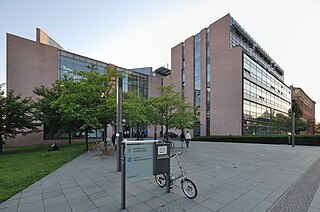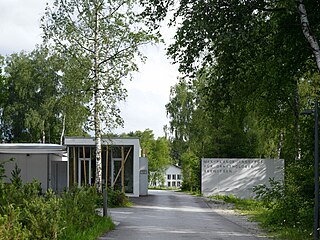
The Max Planck Society for the Advancement of Science is a formally independent non-governmental and non-profit association of German research institutes. Founded in 1911 as the Kaiser Wilhelm Society, it was renamed to the Max Planck Society in 1948 in honor of its former president, theoretical physicist Max Planck. The society is funded by the federal and state governments of Germany.

The Max Planck Institute of Biochemistry is a research institute of the Max Planck Society located in Martinsried, a suburb of Munich. The institute was founded in 1973 by the merger of three formerly independent institutes: the Max Planck Institute of Biochemistry, the Max Planck Institute of Protein and Leather Research, and the Max Planck Institute of Cell Chemistry.

The Max Planck Institute for Biophysical Chemistry, also known as the Karl-Friedrich Bonhoeffer Institute, was a research institute of the Max Planck Society, located in Göttingen, Germany. On January 1, 2022, the institute merged with the Max Planck Institute for Experimental Medicine in Göttingen to form the Max Planck Institute for Multidisciplinary Sciences.

The Gottfried Wilhelm Leibniz Prize, or Leibniz Prize, is awarded by the German Research Foundation to "exceptional scientists and academics for their outstanding achievements in the field of research". Since 1986, up to ten prizes have been awarded annually to individuals or research groups working at a research institution in Germany or at a German research institution abroad. It is considered the most important research award in Germany.

Peter Gruss is a German developmental biologist, president of the Okinawa Institute of Science and Technology, and the former president of the Max-Planck-Gesellschaft.

The Max Planck Institute for Molecular Biomedicine was founded on 1 April 2001 in Münster, North Rhine-Westphalia, Germany. It is part of the Max Planck Society. The current managing director is professor Dietmar Vestweber.

The Max Planck Institute of Molecular Cell Biology and Genetics (MPI-CBG) is a biology research institute located in Dresden, Germany. It was founded in 1998 and was fully operational in 2001. Research groups in the institute work in molecular biology, cell biology, developmental biology, biophysics, systems biology, and mathematics supported by various facilities.

The Max Planck Institute of Biophysics is located in Frankfurt, Germany. It was founded as the Kaiser Wilhelm Institute of Biophysics in 1937, and moved into a new building in 2003. It is an institute of the Max Planck Society.
The Max Planck Institute for Plant Breeding Research was founded in Müncheberg, Germany in 1928 as part of the Kaiser-Wilhelm-Gesellschaft. The founding director, Erwin Baur, initiated breeding programmes with fruits and berries, and basic research on Antirrhinum majus and the domestication of lupins. After the Second World War, the institute moved west to Voldagsen, and was relocated to new buildings on the present site in Cologne in 1955.

The Max Planck Institute for Terrestrial Microbiology is a research institute for terrestrial microbiology in Marburg, Germany. It was founded in 1991 by Rudolf K. Thauer and is one of 80 institutes in the Max Planck Society (Max-Planck-Gesellschaft). Its sister institute is the Max Planck Institute for Marine Microbiology, which was founded a year later in 1992 in Bremen.
The Max Planck Institute of Neurobiology was a research institute of the Max Planck Society located in Martinsried, a suburb of Munich in Germany. It existed between 1984 and 2022 and merged with the Max Planck Institute for Ornithology to the new, joint Max Planck Institute for Biological Intelligence in 2023.
The Max Planck Institute for Marine Microbiology is located in Bremen, Germany. It was founded in 1992, almost a year after the foundation of its sister institute, the Max Planck Institute for Terrestrial Microbiology at Marburg. In 1996, the institute moved into new buildings at the campus of the University of Bremen. It is one of 80 institutes in the Max Planck Society.

The Max Planck Institute of Immunobiology and Epigenetics in Freiburg, Germany is an interdisciplinary research institute that conducts basic research in modern immunobiology, developmental biology and epigenetics. It was founded in 1961 as the Max Planck Institute of Immunobiology and is one of 86 institutions of the Max Planck Society. Originally named the Max Planck Institute of Immunobiology, it was renamed to its current name in 2010 as it widened its research thrusts to the study of epigenetics.

The Max Planck Institute for Infection Biology (MPIIB) is a non-university research institute of the Max Planck Society located in the heart of Berlin in Berlin-Mitte. It was founded in 1993. Arturo Zychlinsky is currently the Managing Director. The MPIIB is divided into nine research groups, two partner groups and two Emeritus Groups of the founding director Stefan H. E. Kaufmann and the director emeritus Thomas F. Meyer. The department "Regulation in Infection Biology" headed by 2020 Nobel laureate Emmanuelle Charpentier was hived off as an independent research center in May 2018. The Max Planck Unit for the Science of Pathogens is now administratively independent of the Max Planck Institute for Infection Biology. In October 2019, Igor Iatsenko and Matthieu Domenech de Cellès established their research groups at the institute, Mark Cronan started his position as research group leader in March 2020. Silvia Portugal joined the institute in June 2020 as Lise Meitner Group Leader. Two more research groups where added in 2020, Felix M. Key joined in September and Olivia Majer in October, completing the reorganization of the Max Planck Institute for Infection Biology. Simone Reber joined as Max Planck Fellow in 2023 and now heads the research group Quantitative Biology.

Dame Linda Partridge is a British geneticist, who studies the biology and genetics of ageing (biogerontology) and age-related diseases, such as Alzheimer's disease and Parkinson's disease. Partridge is currently Weldon Professor of Biometry at the Institute of Healthy Ageing, Research Department of Genetics, Evolution and Environment, University College London, and the Founding Director Emeritus of the Max Planck Institute for the Biology of Ageing in Cologne, Germany.
The Institute of Molecular Biology (IMB) is a modern research centre on the campus of the Johannes Gutenberg University in Mainz, Germany. It is funded by the Boehringer Ingelheim Foundation and the state of Rheinland Palatinate. The scientists at IMB primarily conduct basic science in developmental biology, epigenetics, ageing, genome stability and related areas.
The International Max Planck Research School for Organismal Biology founded in 2009, was a structured doctoral program of the former Max Planck Institute for Ornithology in Seewiesen (Pöcking) and the Department of Biology of the University of Konstanz. In October 2010, the first 30 doctoral students began their research, and until 2023, 105 have graduated. The faculty consisted of over 35 leading scientists with a focus on behavioral science, ecology, evolutionary biology, physiology and neurobiology of the former Max Planck Institute for Ornithology and the Department of Biology at the Universität Konstanz. The goal of the IMPRS for Organismal Biology was to provide first-class training and education to doctoral students from around the world, in a stimulating, world-renown research environment. The school officially ended in 2023.
Regine Kahmann is a German microbiologist and was Director at the Max Planck Institute for Terrestrial Microbiology in Marburg from 2000 to 2019. She was made a Foreign Member of the Royal Society (ForMRS) in 2020.

The Max Planck Institute for Ornithology was a non-university research institution under the sponsorship of the Max Planck Society. As of 1 January 2023, it merged with the Max Planck Institute for Neurobiology (MPIN) to form the new Max Planck Institute for Biological Intelligence (MPI-BI). The MPIO was located in Seewiesen, which belongs to the municipality of Pöcking in Upper Bavaria.
The Max Planck Institute for Biological Intelligence is a non-university research institute of the Max Planck Society. The institute is dedicated to basic research on topics in behavioral ecology, evolutionary biology and neuroscience. Research at the international institute focuses on how animal organisms acquire, store, apply and pass on knowledge about their environment in order to find ever-new solutions to problems and adapt to a constantly changing environment. Model organisms include Drosophila, zebrafish, mice and various bird species.














